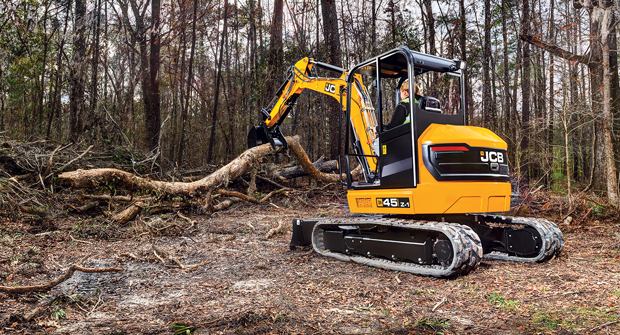
Jeremy Thorne is in his fifth season as a landscape company owner. His Sugarloaf, Pa.-based company, ThorneCare Landscape Solutions, employs three full-time people and has a projected 2019 revenue of $400,000.
It’s a small operation, and fittingly, a mini excavator is the machine that keeps this company growing.

Thorne had been doing landscape installations, when he landed a pretty big hardscape job.
“That’s where I really pulled the trigger on getting an excavator,” Thorne says. “(The mini excavator) is a prime tool, and that’s what pushed me to do it with the jobs we were getting when we first started — I needed that machine almost at every job.”
Thorne and his employees use the Caterpillar 303.5E mini excavator for a variety of applications, and the mini excavator size suits ThorneCare Landscape’s needs best, since all of Thorne’s projects are residential, and he needs to be able to fit into smaller spaces.
Ninety-five percent of ThorneCare Landscape Solutions’ residential projects are landscape renovations or new installations, and the remaining 5 percent of the business is lawn fertilization. Thorne began renting a mini excavator in his first year of business, and three months later, he worked with Caterpillar on a rent-to-own agreement for the machine. He’s now owned the mini excavator four years.
Because of the wet and rainy spring and early summer, the company is currently doing a lot of drainage and pipework, in addition to its typical sidewalk and patio hardscape projects.
For Thorne, the mini excavator has been a helpful tool for labor savings, and he estimates that the machine goes to 90 percent of the company’s jobs.
“We’re all going to get old someday,” he says. “Things like setting boulders, even landscape jobs where most guys wouldn’t take a machine, if I have to dig one thing out, I take it.”
Once Thorne knows he has an employee who is committed to the job, he’s big on training that person to run the excavator properly to make his time on the machine more efficient, since the company averages 250 to 300 hours on the excavator per year.
Versatility equals value

Thorne has multiple buckets for his mini excavator, including a 1-foot bucket for digging for pipe or digging out roots, a 2-foot bucket and a 4-foot smooth dredging bucket, which he uses on patio projects for digging out. The company also has other attachments such as a hydraulic thumb that is helpful when moving debris and removing existing shrubs and paver tools for hardscape projects.
Chris Lucas, product manager for compact excavators at JCB North America, says compact excavators offer unique efficiencies over other types of machines.
“Obviously, compact excavators excel at general excavating and grading,” he says. “With the addition of a thumb attachment, a compact excavator is a very efficient machine for moving materials and debris, possibly into a truck for removal from the site.”
Lucas also points out that with an auger attachment, a compact excavator can make light work of posthole drilling and preparing holes for tree planting. The demolition of sheds, outbuildings and small dwellings is another less conventional application for compact excavators.
Jason Becker, marketing manager, mini excavators for Caterpillar, says people have traditionally associated excavators with digging alone.
“Now they realize they’ve got hydraulics on it, and they can do other things,” he says. “That’s where you see a lot of people now moving toward excavators.”
Mulching heads and brush cutters are new additions to the excavator attachment lineup, he says.
“Of course (contractors) are still utilizing backhoes and skid-steers,” he says. “But a huge application that’s happening now is land management — brush clearing, mulching and brush cutting.”

